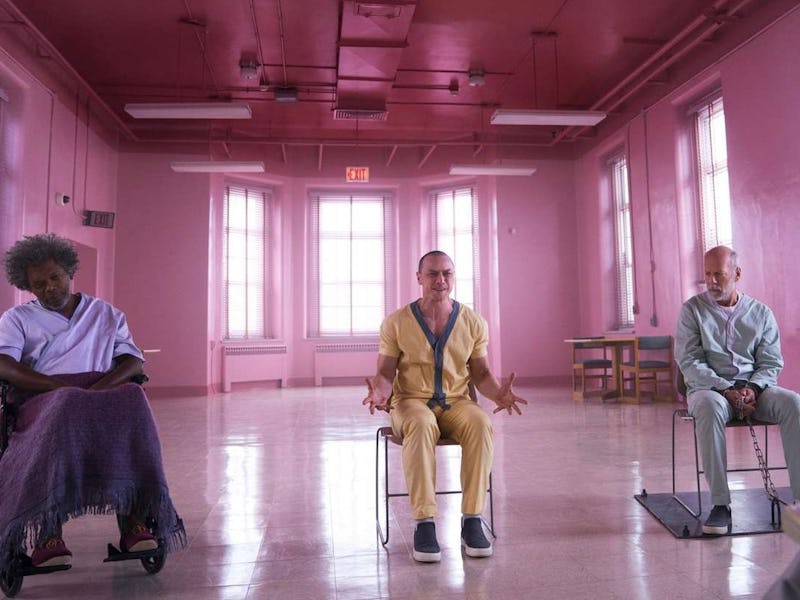M. Night Shyamalan’s Most Disappointing Movie Shows Off His Frustrating Brilliance
So close, and yet so, so far.

M. Night Shyamalan has never been in short supply of big ideas. Ever since he broke through with The Sixth Sense, the director has been working to bring all his high-concept genre ideas to life on as big a canvas as possible. Unfortunately, for as exciting and inventive as many of his films have been, Shyamalan has also repeatedly struggled to effectively communicate his beliefs.
No movie demonstrates that struggle more potently than Glass. A sequel to both 2017’s Split and 2000’s Unbreakable, Glass was the film Shyamalan’s fans had been hoping he’d make for nearly two decades. While the movie doesn’t waste much time bringing the stars of Unbreakable and Split together, Glass spectacularly fails to live up to its potential. In his desperation to subvert expectations and deliver another trademark twist ending, Shyamalan prevented the final installment of his Unbreakable Trilogy from reaching the heights it could have.
The first act of Glass is everything fans could have asked for from an Unbreakable sequel. The opening minutes follow David Dunn (Bruce Willis) as he tracks down Kevin Crumb (James McAvoy) and tries to stop him from killing a group of kidnapped cheerleaders. It’s powerfully edited and paced, and the fight between David and Kevin is the kind of epic-yet-grounded set piece Shyamalan has always excelled at. However, the film quickly goes downhill once Kevin and David are captured by Dr. Ellie Staple (Sarah Paulson), a psychiatrist who locks them up, sedates them, and informs the two men that she believes they suffer from delusions of grandeur.
Glass spends the entirety of its second act in the Raven Hill Memorial Hospital, where Ellie holds Kevin, David, and the latter’s former nemesis, Mr. Glass (Samuel L. Jackson), and it dedicates a misguided number of minutes to sessions where Dr. Staple insists their superpowers aren’t real. Viewers know that’s not true, which means the storyline immediately seems like either a waste of time or fodder for a twist ending. It ultimately proves to be both when it’s revealed that Ellie is a member of a secret organization that’s worked to suppress the existence of superheroes for centuries.
This twist is unveiled in the same sequence where Mr. Glass is killed, Kevin is fatally shot, and David, whose weakness is water, drowns in a puddle. Glass, in other words, stars the anti-climax to end all anti-climaxes. It kills its three leads in a decidedly underwhelming fashion and reveals their deaths were planned by Mr. Glass, who secretly recorded their fight and had it uploaded for public consumption.
Glass then ends with the world’s sudden discovery of superheroes. It’s a conclusion that admirably argues the world is full of special people, and that the systems designed to keep them down aren’t as invincible as we think. But as interesting as Glass’ themes seem on paper, the film does a disservice to its three leads in order to communicate them.
McAvoy is given the most to do, but even his character’s story gets lost in the mess of Shyamalan’s reverse-engineered plotting style. Even worse, the film’s ending seemingly endorses the cynical beliefs of Mr. Glass and Kevin’s superpowered alternate identity, The Beast, who argue that strength can only be found in the wake of pain and trauma. In Glass, hurt people have to die for the world to change.
Glass is an admirably ambitious sequel that fails to deliver the satisfying, cathartic payoff viewers deserve.
What’s particularly frustrating about Glass’ broad ending is that it feels completely antithetical to where its story began. Unbreakable doesn’t argue that strength comes from pain. It’s a film about a man who’s always been strong learning to move past his apathy, fight for his marriage, and accept himself as the hero his son believes he is. The movie is rooted in the specificity of David Dunn’s story, and when he discovers the horrifying scope of Mr. Glass’ plan, he’s appropriately disgusted by it.
Maybe that’s why Glass has so little time for Willis’ David, who’s treated with shocking disinterest. His story not only stands in stark opposition to many of the sequel’s third-act twists and ideas, but it also contains the kind of grounded emotions that Glass lacks. It’s admirable that Shyamalan wanted to explore big ideas about superheroes that franchises like the MCU and the DCU would never touch. But he was so eager to dive in that he forgot the people his movie was about.
This article was originally published on